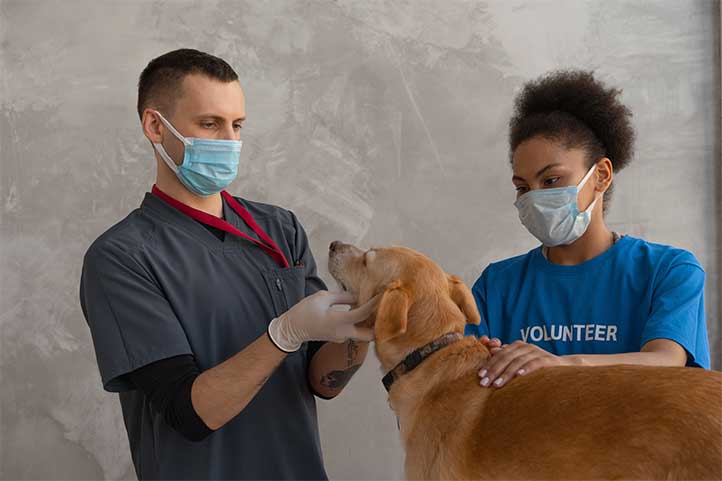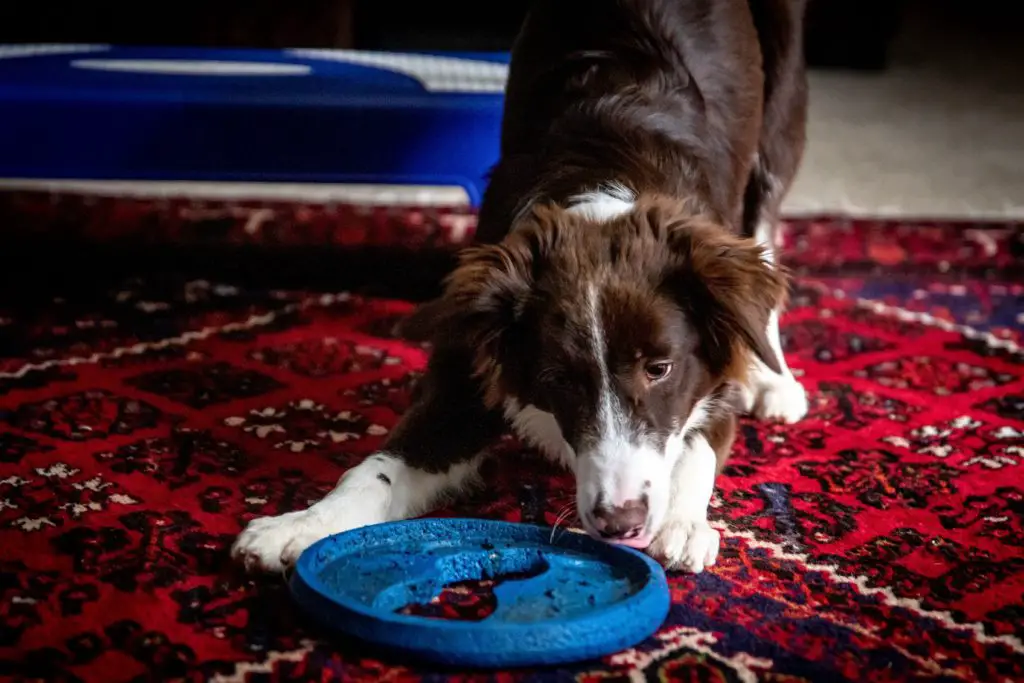Translated by Nick R
When a dog joins your family you must take into account many things to give him the best quality of life, and one of these things is vaccination.
Many diseases can affect dogs: distemper, rabies, or hepatitis, and some of them are more serious than others and could even end the life of your pet. I’ll show you why vaccination is so important and which vaccinations you need to give to your furry friend.
Table of Contents
Why is it important to vaccinate your dog?
Vaccinations help us prevent diseases. They stimulate or help the immune system to learn how to deal with certain diseases.
According to the WHO, World Health Organization, “when we get vaccinated, the immune system produces antibodies, just like when we catch a disease, with the difference that the vaccine contains the microbe (virus or bacteria) killed or weakened” and that is exactly how vaccines work in canines.
The purpose of the vaccine is for the immune system to know the disease and how to fight it by creating antibodies for it. The immune system has memory, which means that after the vaccine it will remember the virus or bacteria that invaded it, and if the disease attacks the canine, the antibodies will know how to defeat it.
Mandatory Vaccinations for Puppies
Canines are born with a weak or immature immune system that needs reinforcement. Colostrum is the main immunity they receive from their mother, being crucial for their survival.
Colostrum is the first secretion the bitch gets for a few days after whelping. It contains more protein than milk and also provides the puppies with immunoglobulins (antibodies).
So, as soon as they are born, this is the only thing that dogs have to protect themselves from different pathogens that can affect them until 6 weeks of life when vaccination begins.
Distemper and parvovirus
This is the first vaccine your puppy will get, it will protect him against parvovirus and distemper (also a viral disease).
Distemper: also known as “distemper”, is a highly contagious viral disease with high mortality rates. It attacks the digestive, respiratory and nervous systems.
“It manifests with fever, and anorexia and the hematological picture reveals a slight leukopenia; it evolves normally accompanied with gastrointestinal, respiratory signs, dehydration, and weight loss. There may be signs involving the central nervous system: involuntary contractions, paralysis, especially of the hind limbs, convulsions, sialorrhea, chewing movements, involuntary urination, and blindness” (Linares-Villalba, Correa-Salgado and Velásquez-Garzón, 2010, p. 78).
Parvovirus: it’s a viral disease that can be lethal and mainly affects puppies. It generally attacks the intestinal tract producing symptoms such as diarrhea, vomiting, fever, loss of appetite and weight loss, pain in the abdomen, dehydration, and even death.
At what age is it applied?
This vaccine should be applied at 6 weeks of life because before this time the canine’s immune system is still developing.
Does it need reinforcement?
At 2 months of age, it is boosted with the pentavalent vaccine.
Cost
The costs may vary according to the country and the veterinarian where it is performed, however, these are some average prices:
Spain: 25 to 35 euros
Colombia: 40,000 to 60,000 pesos.
Mexico: $300 to $350 Mexican pesos
Pentavalent vaccine
The second vaccine that your veterinarian will give your puppy. It will protect against distemper, parvovirus, infectious hepatitis, leptospira and Parainfluenza. Thus, as its name indicates, Penta: 5, it is to protect against 5 microorganisms.
We have already seen what distemper and parvovirus are, but let me explain the others.
Infectious hepatitis: it’s a highly contagious and potentially lethal viral disease. It’s caused by the virus called “canine adenovirus type 1”. It affects the liver and the vascular endothelium: a layer of cells that covers the inside of the blood vessels and if affected, it can severely damage health as it fulfills different functions.
Symptoms include lethargy, swollen tonsils, and lymph nodes, vomiting, diarrhea, loss of appetite, abdominal pain, pale or yellowish mucous membranes, fever, convulsions, corneal edema, and sudden death.
Leptospira: this disease is caused by bacteria of the “leptospira” genus. It’s also considered a zoonosis, meaning that it can spread among different species, including humans. It mainly affects the kidneys and liver, but also the lungs in some cases.
The most frequent symptoms are “hyperthermia, hyperemic (red) conjunctivae and mucous membranes, weakness, depression, adynamia (muscle weakness), anorexia, vomiting, hemorrhages, oliguria, anuria, lumbago, renal pain on palpation, myalgia, diarrhea, jaundice, convulsions, glossitis (swollen tongue), stomatitis (inflammation and infection of the gums), dyspnea (difficulty breathing), polyuria (increased urine output), hypothermia and death. It may develop in different types: subclinical, acute septicemic, ambulatory or chronic infection” (canine Leptospirosis).
Parainfluenza, also known as “kennel cough”, it’s a virus of the Paramyxoviridae family that affects the respiratory system as it locates in the trachea, bronchi, nasal mucosa, and lymphatic ganglions. The symptoms include dry cough, tearing, fever, lethargy, loss of appetite, phlegm, and bronchopneumonia.
At what age is it applied?
It’s applied at 2 months of age.
Cost
Spain: 35 euros
Mexico: $300 to $350 Mexican pesos.
Colombia: 40,000 to 60,000 Mexican pesos.
Pentavalent + canine coronavirus vaccine
This is a booster of the previous vaccine, so it protects against distemper, parvovirus, infectious hepatitis, leptospira, and parainfluenza, and in addition, canine coronavirus.
Canine coronavirus: this infectious disease attacks the gastrointestinal system causing intestinal inflammation. The symptoms that the puppy may show (it can happen in dogs of any age, but it is more common in puppies) are: temperature over 40°C, dehydration, tremors, diarrhea, loss of appetite, blood in the stool, abdominal pain, and vomiting.
It’s not the same as covid 19, it should be clarified that coronaviruses are a large family or group of viruses and this canine coronavirus is not the cause of the current pandemic. On the other hand, the symptoms are not the same either.
At what age is it applied?
This booster is applied at 3 months of age.
Cost
Spain: 35 euros
Mexico: $300 to $350 Mexican pesos
Colombia: 40,000 to 60,000 Mexican pesos.
Hexavalent vaccine
This vaccine includes the pentavalent vaccine (distemper, parvovirus, hepatitis, leptospira, and parainfluenza) + rabies vaccine.
Rabies: it’s a deadly viral disease that affects the nervous system, and it is also a zoonosis (it can also be transmitted to humans). The symptoms can include changes in the canine’s behavior, excessive salivation, aggressive behavior (the canine gets angry easily and bites or attacks), paralysis, and death.
At what age is it applied?
It’s applied at 4 months of age and then reinforcement should be done every year.
Cost
Spain: 25 euros
Mexico: $300 to 350 Mexican pesos
Colombia: 40,000 to 60,000 Mexican pesos.
Optional vaccines for dogs
“Optional vaccines can be given at the discretion of the veterinarian, according to the characteristics adopted by the diseases and taking into account the sanitary and immunization conditions of the area.” (revista de investigaciones veterinarias del Perú).
In other words, depending on the geographical area, the characteristics of the place and other animals the dog lives with or pathologies that the animal presents; an optional vaccine could protect the animal as it is more exposed than other canines.
Giardiasis
It’s an intestinal disease caused by a protozoan called “Giardia lamblia”. It causes diarrhea, soft and bloody stools, loss of appetite, weight loss and gas. It is a zoonosis so it can be transmitted to humans.
At what age is it applied?
Puppies and canines with a weak immune system are most prone to this disease, so it is recommended to start at 8 weeks of age.
Does it need reinforcement?
The second dose is recommended 2 to 4 weeks after the first vaccination.
Cost
Colombia: 40.000 to 60.000 COP
Mexico: $250 to $400 Mexican Pesos
Spain: 25 to 35 euros
Bordetella
Also known as “kennel cough”, it can be caused by one or more infectious agents such as Bordetella bronchiseptica or parainfluenza, which we talked about before.
This vaccine is recommended depending on the geographical location where the dog lives because, although it can be infected at any time of the year, it is more predisposing when the temperature is very cold (in winter). However, the contact the canine has with other dogs can cause him to contract the disease, if he is in competition or goes to day-care centers constantly since it occurs mainly in agglomerations and therefore, these are areas of contagion.
At what age is it applied?
You can vaccinate your dog against bordetella at 3 weeks of age.
Does it need reinforcement?
This vaccine is boosted annually.
Cost
Colombia: 40.000 to 60.000 COP
Mexico: $250 to $400 Mexican Pesos
Spain: 25 to 35 euros
Babesiosis
Babesia canis canis is a parasite transmitted by a kind of tick. It causes pale gums, lethargy, fever, loss of appetite, anemia, and reddish urine.
You may be interested in reading: 11 tips to prevent and eliminate ticks.
There is a vaccine to protect the dog from it, however, it doesn’t prevent its infection, it only reduces the clinical signs or the severity of the disease itself. Also, not all dogs will be successfully protected or served.
At what age is it applied?
From 6 months of age but it can vary, so always consult your veterinarian.
Does it need reinforcement?
The second dose is recommended 3 to 6 weeks after the first vaccination. And then it is revaccinated every 6 to 12 months.
Cost
Colombia: 40,000 to 60,000 COP.
Mexico: $250 to $400 Mexican pesos.
Spain: 25 to 35 euros
Leishmaniasis
It’s caused by the protozoan parasite “Leishmania infatum” transmitted by the bite of a mosquito. This disease causes muscular atrophy, apathy, fever, lameness, swollen eyelids and lacrimation, swollen glands, alopecia (bald patches on specific areas of the body) and weight loss.
The vaccine doesn’t repel the mosquito that carries the parasite, so you must use repellent to avoid mosquito bites.
At what age is it applied?
From 6 months of age, but it can vary so always consult your veterinarian.
Does it need reinforcement?
It’s reinforced annually.
Cost
Colombia: 40.000 to 60.000 COP
Mexico: $250 to $400 Mexican pesos
Spain: 25 to 35 euros
Herpesvirus
This viral disease mainly affects newborn puppies and can cause their death. Some symptoms are abdominal pain and, therefore, whining, weight loss due to starvation, liquid and yellowish stools, subcutaneous edema (swelling of soft tissues), erythema (reddening of the skin) and papules on the abdomen.
Vaccination in pregnant females can protect puppies.
At what age is it applied?
It’s given during estrus or about 10 days after mating has occurred.
Does it need reinforcement?
About 2 weeks before parturition.
Cost
Colombia: 40.000 to 60.000 COP
Mexico: $250 to $400 Mexican pesos.
Spain: 25 to 35 euros
Side effects of vaccines on dogs
It’s normal for dogs to have some symptoms of discomfort a few hours after the vaccination, just like us when we get vaccinated.
As a puppy, every time I took my dog Amber to be vaccinated, the vet would always remind us she might have a slight fever and pain or itching at the injection site, even a little swelling.
Such reactions are usually not serious and fade after 2 to 3 days; however, you can ask your vet for advice on what to do to make your pet feel better.
For example, when we finished my puppy’s vaccination schedule (with the rabies vaccine) she had a lot of pain in the injection area, and they advised us to apply warm water wipes and she stopped complaining after that.
On the other hand, if you notice serious reactions such as high fever, respiratory problems or swelling at the injection site, you must go immediately to your veterinarian.
There is a reaction called “anaphylactic”, which, although not very common, is quite serious. It causes swelling of the muzzle, difficulty breathing, weak pulse, vomiting, and reddening of the skin.
Conclusion
It’s imperative to be clear about which vaccines are necessary for your dog in order to protect him from different diseases that can even be fatal.
Additionally, it’s advisable to deworm the canine a few days before being vaccinated and that he has no health problems at that moment: the immune system must be working perfectly for the vaccination.


